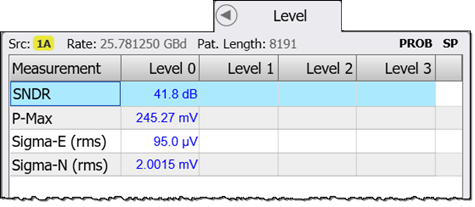:MEASure:PLEVel:SNDRatio
Command Syntax
:MEASure:PLEVel:SNDRatio
Query Syntax
:MEASure:PLEVel:SNDRatio?
Description
 Runs or returns the results for a Signal-to-Noise-and-Distortion Ratio (SNDR) measurement. For the output signal of a transmitter, the SNDR measurement compares a calculated ideal signal (linear pulse fit) to the measured signal with the P-Max (pmax) or P-Signal (psignal), Sigma E (σe rms), and Sigma-N (σn rms) terms as shown in this equation.
Runs or returns the results for a Signal-to-Noise-and-Distortion Ratio (SNDR) measurement. For the output signal of a transmitter, the SNDR measurement compares a calculated ideal signal (linear pulse fit) to the measured signal with the P-Max (pmax) or P-Signal (psignal), Sigma E (σe rms), and Sigma-N (σn rms) terms as shown in this equation.

The measurement requires a specified pattern, so confirm that you are using the correct pattern before you perform this measurement. Use the following tables to discover the commands needed to configure this measurement and how to return and display measurement terms calculated within SNDR algorithm.
| Select | Command |
|---|---|
| Linear pulse fit definition (P-Max) | :MEASure:AMPLitude:DEFine:SNDRatio:DEFinition
|
| Linear pulse fit definition (P-Signal) | |
| Pulse Delay | :MEASure:AMPLitude:DEFine:SNDRatio:PDELay
|
| Pulse Length | :MEASure:AMPLitude:DEFine:SNDRatio:PLENgth
|
| Measurement | Term | Command | Definition |
|---|---|---|---|
| P-Max | Pmax | :MEASure:PLEVel:PSIGnal
|
Measured amplitude of the extracted linear pulse response. |
| P-Signal | Psignal | ||
| Sigma-E (rms) | σe rms | :MEASure:PLEVel:SERRor
|
The standard deviation of the distortion. |
| Sigma-N (rms) | σn rms | :MEASure:PLEVel:SNOise
|
The standard deviation of the signal noise. |
Requires FlexDCA revision A.07.90 and above.
Measurement Identification
Avoid subtle programming errors! To ensure that the correct measurement is installed or queried, always explicitly identify a measurement when installing a measurement or querying a measured value, status, or detail. To identify a measurement, specify the measurement's source waveform (:SOURce child command). With some measurements, you may also need to specify other identifying values. Generally, when selecting a measurement using FlexDCA's GUI, if a dialog appears prompting you to select values, you should explicitly specify these values when remotely identifying the measurement. More information.
For example, to return the status of the measurement, :MEASure:PLEVel:SNDRatio:
flex.write(':MEASure:PLEVel:SNDRatio:SOURce CHAN1A')
if flex.query(':MEASure:PLEVel:SNDRatio:STATus?') == 'CORR';
measurement = flex.query(':MEASure:PLEVel:SNDRatio?')
else:
details = flex.query(':MEASure:PLEVel:SNDRatio:STATus:DETails?')
reason = flex.query(':MEASure:PLEVel:SNDRatio:STATus:REASon?')
Measurement Ready?
To confirm that the measurement is ready to read, you can query the measurement's status:
if ('CORR' in Flex.query(':MEASure:PLEVel:SNDRatio:STATus?')):
measurement = Flex.query(':MEASure:PLEVel:SNDRatio?')
If averaging is turned on (:ACQuire:AVERaging), you can also confirm if the measurement result is ready by comparing the number of specified averages (:ACQuire:ECOunt?) versus the number of measurement sweeps that have occurred (:MEASure:PLEVel:SNDRatio:COUNt?). The technique uses the :COUNt? common measurement query. For example,
if (Flex.query(':MEASure:PLEVel:SNDRatio:COUNt?') >= Flex.query(':ACQuire:ECOUNt?')):
measurement = Flex.query(':MEASure:PLEVel:SNDRatio?')
You can also use an acquisition limit lest to test that a number of waveform samples, or pattern acquisitions have completed before returning a measurement. Refer to the :LTESt:ACQuire:CTYPe command.
Common Measurement Child Queries
This command supports the use of the following common measurement queries: :LOCation?, :COUNt?, :MAXimum?, :MINimum?, :MEAN?, and :SDEViation?.
Example Command Sequence
The following commands configure and runs the SNDR measurements resulting in the measurement list on FlexDCA's Level panel as shown in this picture. The last four lines are equivalent to clicking the SNDR measurement button on FlexDCA's GUI.
The :MEASure:AMPLitude:DEFine:SNDRatio:DEFinition command's argument determines the name of the measurement that is shown in the table by the :MEASure:PLEVel:PSIGnal command: P-Max or P-Signal.

:MEASure:AMPLitude:DEFine:SNDRatio:DEFinition PMAX :MEASure:AMPLitude:DEFine:SNDRatio:PDELay 4 :MEASure:AMPLitude:DEFine:SNDRatio:PLENgth 200 :MEASure:PLEVel:SNOise :MEASure:PLEVel:SERRor :MEASure:PLEVel:PSIGnal :MEASure:PLEVel:SNDRatio